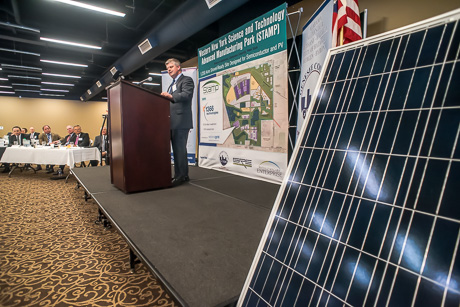
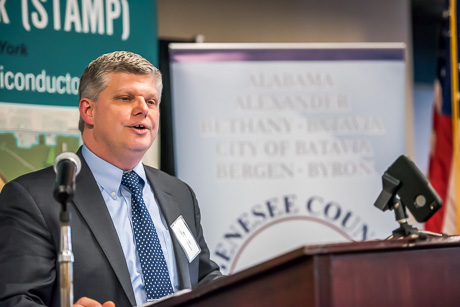
The solar wafer manufacturer has recently completed contracts with solar panel manufacturers that will fulfill orders for 60 percent of plant's production capacity, Eller said.
"This is part of the steady, deliberate process," Eller said. "We keep knocking them off to reduce the risk to the business, because if you sell everything before you start, then you execute, you don't have to go to market and figure out your market."
Eller was the keynote speaker for the annual meeting, which was attended by more than 350 people.
During his 20-minute presentation, Eller described the methodical approach 1366 Technologies has taken to build its business and the foundation for success. It's a classic start-up model: Begin with a prototype product and get it to market and see how it does, concentrate on a single product, then target a niche of customers, then scale your production once you're ready to reach a market with the potential to achieve substantial returns on investment.
The company was founded in 2008 in Bedford, Mass., where it set up a small, prototype plant to test its proprietary process for manufacturing silicon wafer chips for solar panels. That plant has produced and the company has sold thousands of wafers.
With the process established, 1366 began looking for a site appropriate for its business, settling on Alabama and GCEDC's STAMP project because of the promising local workforce, proximity to universities and the availability of clean, hydro energy.
"One of STAMP's strengths is the talent pool in the region," Eller said. “You know, the thing about changing the world is you need skilled people around you."
The company is planning a $700 million investment in its new facility, to be constructed on about 8 percent of the 12,500-acre WNY Science and Technology Advanced Manufacturing Park. STAMP is the brainchild of Steve Hyde, CEO of GCEDC. The center is assisting in the project with tax abatements worth a potential $97 million over 10 years. The state and federal government have also pledged millions for infrastructure at the project site, which GCEDC and regional economic development agencies are working to fill with other high-tech manufacturers.
When the plant is at full capacity -- producing enough wafers each year to provide three gigawatts of electricity -- it will employ 1,000 people. In the near term, 1366 will hire 150 people, though Eller said there isn't a timeline on the hiring process yet. The company is still in the process of hiring consultants, planners, architects and engineers.
Eller did promise the development process will be public and transparent and that all who compete for contracts on the project will do so on a level playing field.
Eller is full of confidence that 1366 will revolutionize solar technology.
"Our process slashes the cost of making the wafer in half and in doing so drastically reduces the cost of solar energy," Eller said. "Those reductions, well, they accelerate adoption. We believe solar will be ubiquitous. It will displace coal as the cheapest fuel source on the planet."
The current process, which the industry has used for nearly four decades, requires multiple steps, using several machines and takes days. The 1366 process involves one machine that will produce a new wafer every 20 seconds.
The technology was developed at the Massachusetts Institute of Technology. Instead of cutting and grinding solar ingots into flat wafers, which takes energy and produces waste, the 1366 process melts the silicon and floats it into thin layers that harden into silicon wafers.
Eller compared it to the Pilkington float glass process developed in the 1950s and still the process used today for manufacturing flat glass.
"Manufacturing process innovations like ours have true staying power," Eller said. "They simply don’t come along every day."
The solar industry is booming the world over.
Last year, 59 gigawatts of new solar capacity was brought online. That's the result of 240 million solar panels being produced. Eller said that's a big number, so to help understand it, he said, that's more electrical capacity than needed for a year by the entire State of New York.
"We make the most expensive part of the solar panel for half the cost," Eller said. "That was a hard problem to solve, but we've done it. Now we're free to pursue an $8 billion and growing solar market without distraction."
Eller acknowledged that there has been some bad news in the solar industry in recent years, with companies going under or changing directions, but Eller said the slow and deliberate process 1366 has pursued to build the company puts it in a position to succeed.
"The industry consists of exceptional businesses, both established and new, that are efficient, innovative and motivated," Eller said. "To be young in solar is not without its challenges and we are aware of other companies in solar that struggled to compete globally, focused on the wrong technologies or just simply scaled too quickly," Eller said. "We are focused on bringing a highly innovative product to market with deliberate and steady progress."
CLARIFICATIONS:
The folks at 1366 asked us to clarify, by "Day 1," they mean when the first plant is at full production, not the day the plant doors open. There will be a three- or four-month ramp up period to bring the plant up to production levels, which includes hiring and training workers.
Also, in reference to the amount of power from last year's productions of solar panels, we misunderstood. It's not enough electricity to power of all of New York. It's enough for all New York households.
For prior coverage of 1366 Technologies, click here.
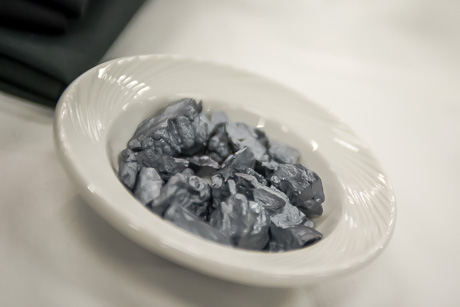
Above, silicon nuggets. Silicon is produced from super heating silica, commonly found in sand, but also found in clay and rock (it's the most common mineral on the planet). When 1366 started to develop its process, silicon was still not a common wafer ingredient, but now 90 percent of all solar wafers manufactured today use silicon.
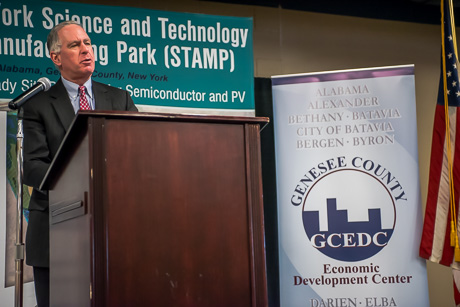
Sen. Mike Ranzenhofer (above) and Assemblyman Steve Hawley (below) both spoke briefly and praised and thanked each other for their united effort to help provide the legislative support to bring 1366 to STAMP.
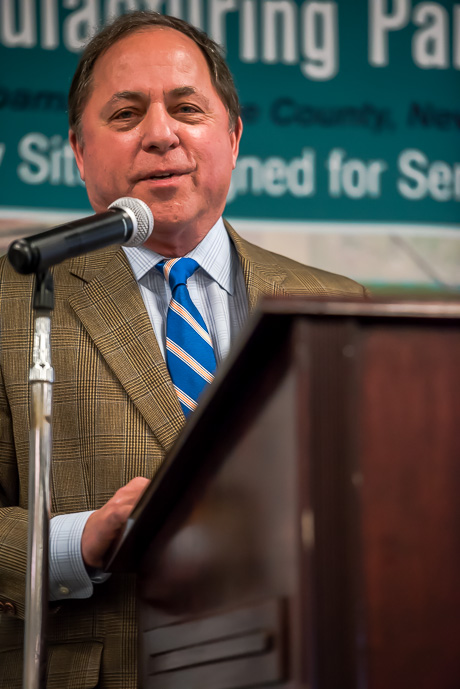
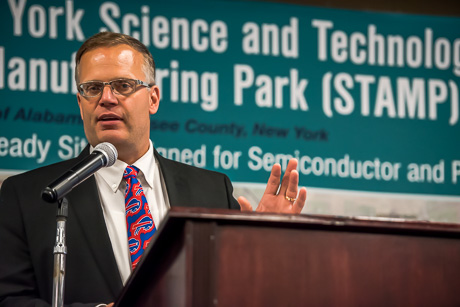
Steve Hyde.
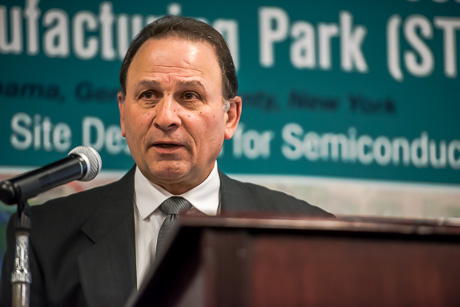
Ray Cianfrini, chairman of the Genesee County Legislature.
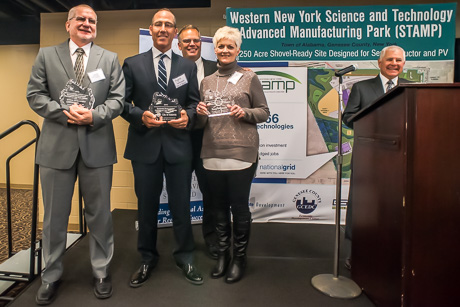
GCEDC presented an Economic Development Award to the Batavia Development Corp., represented by Ray Chaya, the City of Batavia, Eugene Jankowski, and the Town of Batavia, Patti Michalak. Steve Hyde, back row, and GCEDC Board Chairman Paul Battaglia to the right.

If you live in the City of
If you live in the City of Batavia 1st Ward, and have questions about the GCEDC, the City budget or other issues, you have the chance to ask them.
1st Ward City Councilman Paul Viele and Legislator John Deleo (representing the 1st Ward also) will have a 1st Ward neighborhood meeting today at the Salvation Army building on Main Street, today, March 5th, at 4:30 PM
"This is part of the steady,
"This is part of the steady, deliberate process," Eller said. "We keep knocking them off to reduce the risk to the business, because if you sell everything before you start, then you execute, you don't have to go to market and figure out your market."
Steve Hyde better look out. Mr. Eller sounds like another, slick, BS artist, and could possibly be after Steve's position.
Batavia Development Corp.,
Batavia Development Corp., the City of Batavia, and the Town of Batavia were presented an Economic Development Award. how nice and the award was for ??? Who paid for those stupid things? Got to be so easy spending other people's money. Looking forward to the taxpayer getting an award like maybe a property tax rebate, any trophy awards can be forwarded to stevie's board room.
This pep rally did not mention the high paying jobs that were boasted about in previous ones. Wish the Batavian would report to us what wage 1366 considers as a high paying job.
David - the high wages were
David - the high wages were already reported on:
From http://www.thebatavian.com/howard-b-owens/the-promise-and-the-peril-of-…
"Entry-level jobs will start at $16 an hour, with production jobs going up to $24 an hour based on duties and experience."